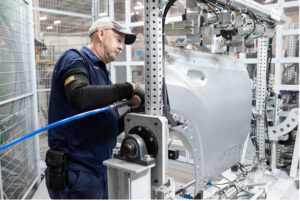
Aluminum parts in body shop at BMW Manufacturing Plant Spartanburg. Photo courtesy BMW.
The BMW Group has signed a memorandum of understanding to source aluminum with significantly reduced CO2 emissions from Rio Tinto’s hydro-powered operations, starting in 2024.
Rio Tinto’s approach to manufacturing aluminum saves approximately 70 per cent of CO2 emissions compared to conventionally manufactured aluminum.
The planned supply volumes will be used exclusively in vehicle production at BMW Group Plant Spartanburg in South Carolina, in body components like the bonnet.
“Canada is a global destination of choice for low-carbon investment,” said the Honourable François-Philippe Champagne, Canada’s Minister of Innovation, Science and Industry. “This exciting partnership between BMW and Rio Tinto is proof that Canada is well positioned to seize the economic benefits of the clean economy. I am proud to see that low-carbon Canadian aluminum will be going into BMW’s vehicles.
“Canada will continue to enhance our competitive advantages—abundance of critical minerals, skilled labour, clean energy, proximity to markets—to grow our economy and to support made-in-Canada innovation.”
Aluminium occupies a firm place in the BMW Group’s intelligent composite construction because of its comparatively low weight and other favourable material properties.
Hydro-powered operation plants underline the tremendous potential of reducing CO2 in the aluminum supply chain since approximately one-quarter of CO2 emissions are attributable to aluminum in the supply chain of a mid-sized, fully electric vehicle.
